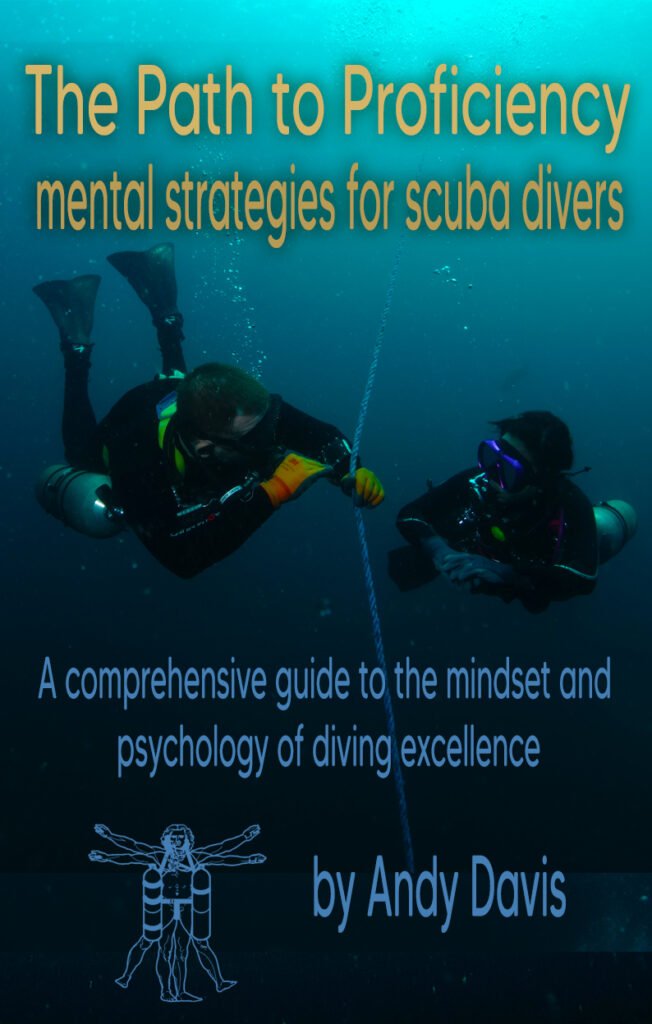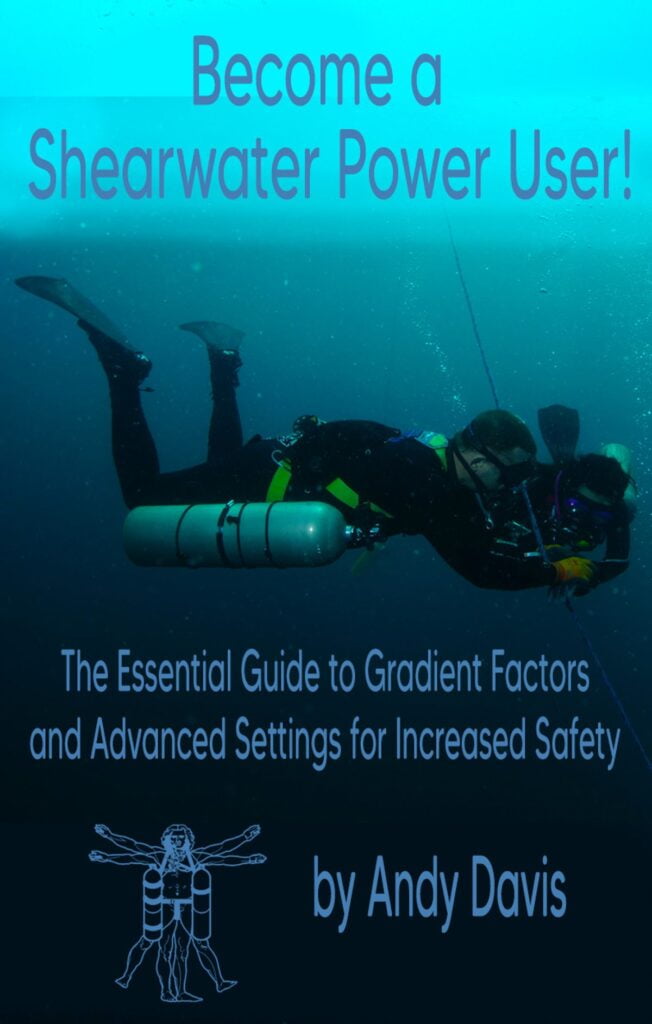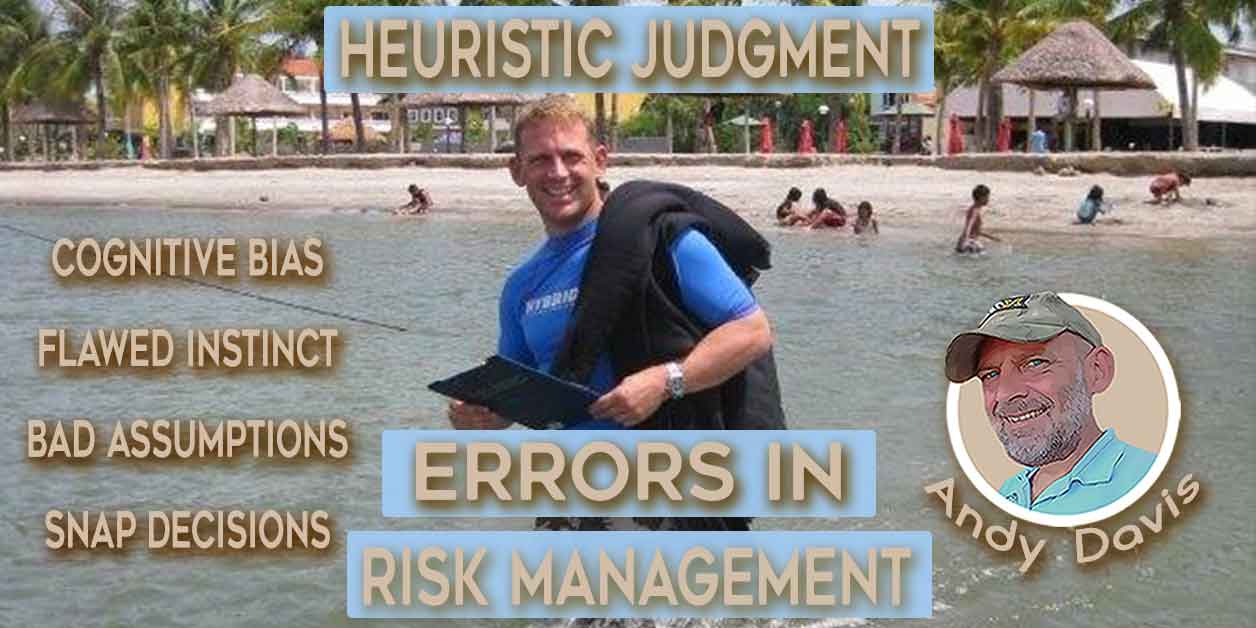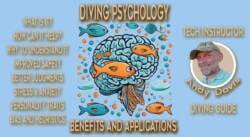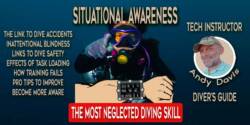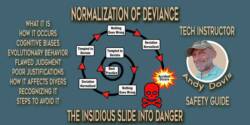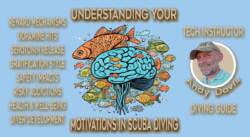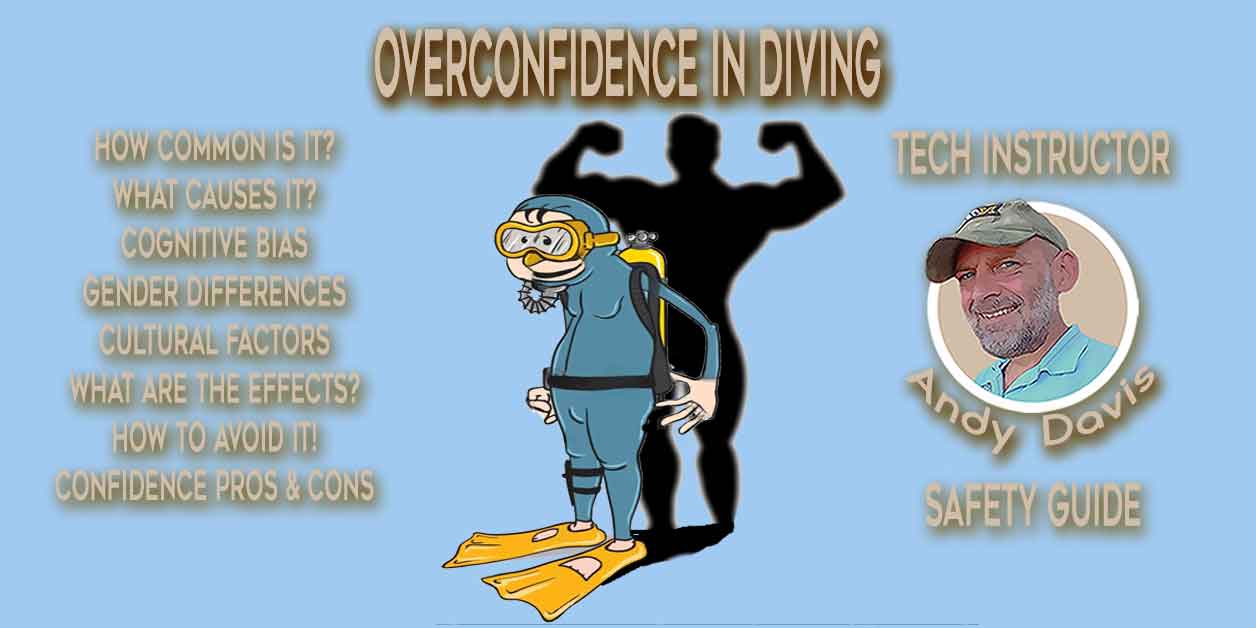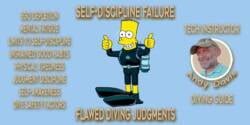Psychopathy and Technical Divers: How Adaptive Psychopathic Traits Benefit Elite Divers
Are elite technical divers psychopathic? Some probably are. Yikes! However, before you dash off to buy a bigger dive knife, it’s important to understand what psychopathy actually means. Some adaptive, pro-social, and psychopathic traits are key drivers of success in a range of fields. Especially those associated with risk, competitiveness, and the need for high emotional resilience.
Misunderstandings About Psychopathy
The public’s perception of psychopathy is heavily influenced by sensationalized media portrayals and cultural stereotypes that sensationalize and fixate on extreme cases of violent criminal behavior. These depictions create a pervasive stereotype of psychopaths as inherently dangerous and morally corrupt individuals, oversimplifying the complexity of the disorder.
The vast majority of studies on psychopaths have been conducted on inmates, leading to this standard negative description of psychopathy
Guillaume Durand, Department of Psychiatry and Neuropsychology, Maastricht University, The Netherlands
Early studies on psychopathy, typically focused on prison populations. This limitation skewed perceptions by emphasizing negative or unsuccessful presentations of psychopathy. Consequently, there is a very negative stigma attached to psychopathy, leading to widespread misconceptions that all psychopaths exhibit violent tendencies or lack empathy.
In reality, psychopathy is characterized by a spectrum of traits, including practiced charm and a lack of emotional (affective) empathy. However, most individuals with these traits do not engage in violence, criminality, sadism, or Machiavellian behavior. In short, they do not pose a threat or detriment to others.
Understanding Empathy
Cognitive empathy and affective empathy are two distinct forms of empathy:
- Cognitive Empathy: This type of empathy involves understanding another person’s perspective and emotions without sharing their feelings. It focuses on the intellectual comprehension of others’ emotions and thoughts.
- Affective Empathy: Also known as emotional empathy, affective empathy involves sharing the emotional experience of another person. It entails feeling what another person feels, often leading to a strong emotional response.
In essence, cognitive empathy is about understanding, while affective empathy includes feeling what others feel. Both types are crucial in social interactions and leadership roles, each contributing uniquely to emotional intelligence and relationship dynamics.
While a small minority of people are exceptionally high in affective empathy (i.e. empaths), others more exclusively favor cognitive empathy. Higher cognitive empathy is associated with more effective emotional regulation and reduced emotional interference in task completion, decision-making, and behaviors.
Although the term psychopathy is embedded with negativity, evidence points to the existence of another
Guillaume Durand, Department of Psychiatry and Neuropsychology, Maastricht University, The Netherlands
form of psychopathy, which involves adaptive traits such as stress and anxiety immunity, remarkable
social skills, noteworthy leadership ability, and an absence of fear.
This lack of understanding perpetuates fear and misunderstanding about psychopathy, obscuring the broader range of successful behaviors and motivations that individuals with psychopathic traits may exhibit.
Common Misperceptions About Psychopathy
- Psychopaths are all violent, sadistic criminals: This misconception arises from media sensationalism, focusing disproportionately on extreme cases of violence.
- Psychopaths lack emotions entirely: Contrary to popular belief, psychopaths do experience emotions but may display them differently, showing shallow affect rather than deep emotional responses.
- Psychopaths are Machiavellian: While manipulation is a trait associated with psychopathy, not all psychopaths use it harmfully or define themselves by it.
“Psychopathy was positively associated with in-house ratings of charisma and presentation style: creativity, good strategic thinking, and excellent communication skills.”
Kevin Dutton, The Wisdom of Psychopaths: What Saints, Spies, and Serial Killers Can Teach Us About Success
Advantages of Psychopathic Traits
Despite the negative stereotypes, psychopathic traits can offer adaptive advantages in specific contexts. These are theorized to have evolved in small numbers amongst the human population to aid group survival and success.
- Boldness: Psychopaths exhibit low levels of anxiety and neuroticism. Fearlessness and self-assurance are beneficial in high-stress and competitive environments.
- Focus and Goal Orientation: The ability to intensely focus on goals without emotional interference can lead to high performance in fields like surgery and business.
- Effective Leadership: Traits like charisma, charm, influence, and decisiveness are typically associated with strong, effective leadership.
- Mental Toughness: Psychopaths often exhibit heightened emotional resilience, enabling them to stay calm under pressure and make tough decisions swiftly.
- Effective Risk Management: Their ability to assess risks without emotional bias can lead to more calculated risks and strategic decision-making in high-stakes situations.
- Charm and Persuasiveness: Psychopaths can be exceptionally charming and persuasive, traits that can be advantageous in professions requiring negotiation, leadership, or public speaking.
- Confidence and Assertiveness: Psychopaths often possess high self-confidence and assertiveness, which are beneficial in competitive environments and leadership roles.
- Cognitive Empathy: While lacking emotional empathy, psychopaths generally possess high cognitive empathy, enabling them to understand people and social situations effectively in an objective manner.
“…psychopathy should be seen as a combination of maladaptive and adaptive traits”.
Guillaume Durand, Department of Psychiatry and Neuropsychology, Maastricht University, The Netherlands
Fearless Dominance in Psychopathy
Fearless dominance is a psychopathic trait characterized by a lack of fear, social dominance, and resilience in stressful situations. Individuals high in fearless dominance exhibit boldness, self-assurance, and the ability to remain calm under pressure.
“Ruthlessness, charm, focus, mental toughness, fearlessness, mindfulness (living in the moment), and action. Who wouldn’t, at certain points in their lives, benefit from kicking one or two of them up a notch?”
Kevin Dutton, The Wisdom of Psychopaths: What Saints, Spies, and Serial Killers Can Teach Us About Success
This trait is associated with adaptive behaviors in competitive environments and leadership roles, where strategic decision-making and assertiveness are valued. Importantly, fearless dominance does not imply aggression or criminal behavior but rather a strategic approach to achieving tough goals with reduced emotional reactivity.
Famous individuals assessed to be strong in the psychopathic trait of fearless dominance (amongst others) include;
- Theodore Roosevelt
- John F. Kennedy
- Winston Churchill
- Mahatma Gandhi
- Mother Teresa
- Nelson Mandela
“Traits that are common among psychopathic serial killers–a grandiose sense of self-worth, persuasiveness, superficial charm, ruthlessness, lack of remorse, and the manipulation of others–are also shared by politicians and world leaders.”
Kevin Dutton, The Wisdom of Psychopaths: What Saints, Spies, and Serial Killers Can Teach Us About Success
Psychopathy in Specialized Fields
Psychopathic traits are observed frequently amongst professions requiring high-stress tolerance, bold decision-making, and emotional detachment:
- C-Suite Business Executives: Their ability to remain calm under pressure and make ruthless decisions can lead to success in corporate environments
- Surgeons: The high-pressure, high-stakes nature of surgery benefits from their focused and fearless demeanor. Emotional detachment, rather than high empathy, is critical for effective decision-making when conducting surgeries.
- Lawyers: The ability to manipulate and persuade is definitive of high-performing lawyers. Courtroom performances emphasize high cognitive empathy, rather than emotional empathy. Judges must also make decisions based on logic and reason, rather than emotions and sentiment.
- Elite Military: Special operations soldiers are renowned and respected for their ability to operate effectively under high pressure in perilous situations. High emotional empathy would be a barrier to the controlled aggression and violence intrinsic to their role.
Understanding the adaptive aspects of psychopathy challenges negative stereotypes and highlights its potential benefits in contexts requiring assertiveness, effective decision-making under pressure, and strategic leadership.
“Without doubt, there’s a greater proportion of psychopathic big-hitters in the corporate world than there are in the general population. You’ll find them in any organisation where your position and status afford you power and control over others, and the chance of material gain.”
Kevin Dutton, The Wisdom of Psychopaths: What Saints, Spies, and Serial Killers Can Teach Us About Success
The Science of Successful Psychopathy
Modern psychology is increasingly interested in “successful” psychopaths. Also known as ‘adaptive’ or ‘functional’ psychopaths, these individuals possess psychopathic traits but moderate their behaviors to avoid anti-social actions and negative impacts upon others.
Study methods, such as the ‘Durand Adaptive Psychopathic Traits Questionnaire‘ show distinct differences between criminal psychopathy and adaptive, successful psychopathy.

Psychopathy Study by Kevin Dutton
Kevin Dutton, a renowned University of Oxford psychologist, has extensively researched psychopathy, challenging conventional perspectives with his groundbreaking work. His book “The Wisdom of Psychopaths: What Saints, Spies, and Serial Killers Can Teach Us About Success” explores how psychopathic traits can contribute positively in competitive environments.
Dutton identifies several key psychopathic traits that can be advantageous in specific contexts. Fearlessness is a prominent trait among psychopaths, who exhibit an unusual lack of fear in situations that typically induce anxiety in others.
“Every society needs particular individuals to do its dirty work for it.”
Kevin Dutton, The Wisdom of Psychopaths: What Saints, Spies, and Serial Killers Can Teach Us About Success
This fearlessness, coupled with charm and manipulation skills, allows psychopaths to navigate social interactions adeptly and influence outcomes to their advantage. They make decisions ruthlessly, unencumbered by emotions like guilt or remorse, and maintain intense focus and composure under stress.
In 2011, Dutton conducted the Great British Psychopath Survey. From that survey, he concluded that the ten professions that have the highest proportion of psychopaths are:
- CEOs
- Lawyers
- Media (TV and radio)
- Salespeople
- Surgeons
- Journalists
- Police officers
- Clergy
- Chefs
- Civil servants
However, people in fields such as politics, elite sports, religious leadership, and military special operations are a tiny minority of the population. He noted that these fields may be high in proportion of psychopaths, even though his survey could not represent that.
James Fallon’s Account of Psychopathy
James Fallon was a professor of psychiatry and neurobiology at the University of California who became famous for his research on psychopathy. He gained global media attention after using his own brain as a control in brain imaging research, only to find startling similarities to the neurology and genetics of psychopathic individuals.
Fallon describes himself as a “pro-social” psychopath, a term he uses to characterize individuals who exhibit some psychopathic traits but channel them in socially acceptable and non-harmful ways. Unlike traditional psychopaths who may engage in antisocial behaviors,
Fallon’s psychopathic tendencies manifest benignly. He attributes this to his nurturing upbringing and supportive environment, which he believes mitigated the potentially negative impacts of his psychopathic brain structure.
James Fallon’s book, titled “The Psychopath Inside: A Neuroscientist’s Personal Journey into the Dark Side of the Brain“, is a fascinating personal journey of grappling with the revelation of being psychopathic, yet juxtaposing it against his outwardly normal life as a respected scientist and family man.
How Does Psychopathy Fit With Technical Diving?
Having dispelled some myths and misperceptions about psychopathy, we can consider how these traits may fit with the characteristics of elite divers.
The following psychopathy-related traits and characteristics can be observed in some elite technical divers:
High Risk Tolerance
Elite technical divers often exhibit a high tolerance for risk, enabling them to make objective, calculated risk management decisions when achieving extraordinary diving goals. However, if high levels of risk tolerance are not effectively counter-balanced by rationality and self-control, they can lead to irresponsible and dangerous behaviors.
Coolness under Pressure
Psychopathic traits like stress immunity and emotional detachment contribute to maintaining composure in high-stress situations, which is crucial for diving explorers facing intense physical or psychological demands. That same emotional detachment can lead to relationship problems with others.
Impulsivity in Positive Contexts
High-level technical divers, similarly to adaptive psychopaths, can make quick decisions and pursue intimidating goals without being hindered by excessive caution. There is a fine line between positive impulsivity and recklessness. That line is often drawn by the individual’s self-control, contentiousness, and narcissistic fears of not wanting to fail or appear foolish.
“For a test pilot the right stuff in the prayer department was not “Please, God, don’t let me blow up.” No, the supplication at such a moment was “Please, dear God, don’t let me fuck up.”
? Tom Wolfe, The Right Stuff
Goal Orientation and Persistence
Both elite divers and adaptive psychopaths exhibit a strong drive for success and achievement. This is combined with persistence in pursuing their goals. However, if that orientation favors narcissism rather than self-discipline and humility, it can lead to destructive goal pursuit behaviors. For example, the death of Doc Deep.
It was about finding the limits of what was known yet pushing them further; it was about going beyond the brink, beyond where you were supposed to stop.
? Tom Wolfe, The Right Stuff
Charisma and Interpersonal Influence
Some adaptive psychopathic traits, like charisma and persuasion, contribute to effective leadership and social influence amongst pioneers of technical diving. The downside to high charisma and influence is that an individual may succumb to manipulating others to achieve their own goals.
Fearless Dominance
Pioneering technical divers require authority, assertiveness, and boldness. These are essential for evolving best practices, managing high-performing teams, and acting as gatekeepers or peer assessors. Obviously, interpersonal dominance and high self-confidence can be perceived negatively by others if the accompanying charm and charisma break down.
Rational Thinking
Emotional detachment favors rational thinking, objective decision-making, and the avoidance of cognitive bias. This leads to safer judgments and more effective dive planning. However, too much rationality tends to negatively impact emotional intelligence and understanding the emotional needs of others.
Perfectionism
Adaptive psychopaths have a strong tendency towards the pursuit of excellence. The same trait is virtually a necessity in how leading technical divers seek to hone their skills and knowledge. Elite divers are driven by a desire to be the best in their field, constantly pushing themselves to achieve greatness. They are committed to constantly improving their skills and knowledge to become the best possible divers.
However, in a negative aspect, perfectionism can lead to unrealistically high expectations of others, perceptions of egotism or superiority by others, and a critical nature that strains interpersonal relationships.
Emotional Resilience
Active participation in the technical diving community confronts divers with mortality. Over time, friends and buddies will die in the pursuit of their passion. Emotional resilience is a critical trait amongst those who stay committed to high-level diving in the aftermath of tragedies. When this trait is negative, it can make an individual appear cold, uncaring, distant, and uncompassionate.
Instrumentality
Instrumentality involves striving for achievement and goal-oriented behavior. Positive aspects include a desire to master skills, take pride in high-quality work, and achieve personal goals. However, less desirable aspects of instrumentality can manifest as excessive competitiveness and a tendency to seek dominance over others.
Expressivity
Expressivity pertains to one’s manner of communication and interaction. Positive aspects encompass warmth and receptiveness towards others’ needs. Conversely, less favorable aspects of expressivity may involve tendencies towards passive-aggressiveness or verbal aggression.
The Right Psychopathic Traits in the Right Context
At the highest levels of technical diving, the right traits can make all the difference between success and failure. As we’ve explored, adaptive psychopathic traits—such as fearlessness, focus, and a calm demeanor under pressure—can offer significant advantages for elite tech divers. These traits allow divers to manage the extreme environments and complex tasks that characterize technical diving with greater efficacy.
However, it’s important to recognize that the benefits of these traits are context-dependent. While adaptive psychopathic traits enhance performance in explorational technical diving, they must be balanced by learned behavioral controls. These acquireable skills for social and team functionality include; self-discipline, harmonious collaboration, conflict management, patience, humility, and sound ethical judgment.
Ultimately, the intersection of psychopathy and elite technical diving ability illustrates a broader principle: the value of specific traits is determined by the context in which they are applied. By understanding and harnessing the right traits in the right context, tech divers can push the boundaries of underwater exploration while ensuring safety and success.
Purchase my exclusive ebook!
A comprehensive guide to the mindset and psychology of diving excellence.
$20 Printable PDF Format, 298 pages
About The Author

Andy Davis is a RAID, PADI TecRec, ANDI, BSAC, and SSI-qualified independent technical diving instructor who specializes in teaching sidemount, trimix, and advanced wreck diving courses.
Currently residing in Subic Bay, Philippines; he has amassed more than 10,000 open-circuit and CCR dives over three decades of challenging diving across the globe.
Andy has published numerous diving magazine articles and designed advanced certification courses for several dive training agencies, He regularly tests and reviews new dive gear for scuba equipment manufacturers. Andy is currently writing a series of advanced diving books and creating a range of tech diving clothing and accessories.
Prior to becoming a professional technical diving educator in 2006, Andy was a commissioned officer in the Royal Air Force and has served in Iraq, Afghanistan, Belize, and Cyprus.
In 2023, Andy was named in the “Who’s Who of Sidemount” list by GUE InDepth Magazine.
Purchase my exclusive diving ebooks!
Originally posted 2024-07-11 20:12:51.



